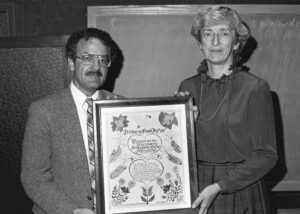A relative of mine sometimes starts out a funny story with the line, “It seemed like a good idea at the time.” Ah, yes, how things can turn from well-intentioned to humorous! Or much worse.
Last fall, I attended a lecture by Reina Neufeldt entitled “When good intentions are not enough: Confronting ethical challenges in peacebuilding and reconciliation.” Neufeldt is a professor in the Peace and Conflict Studies program at Conrad Grebel University College, where she is described as a practitioner of “reflective peacebuilding.” (Her recorded lecture is online at .bit.ly/2BGQWLd.)
Neufeldt has done research around the ethics of peacebuilding and has worked with nongovernmental organizations involved in international peacebuilding projects. From her on-the-ground experience with communities and societies in conflict, she gleaned stories that illustrate how the best efforts of individuals and organizations sometimes brought about bad results, and even death. It turns out that even the noble goal of making peace can cause trouble.
Neufeldt offered caution on how our good intentions can cause failure in peacebuilding. She charged listeners to examine the moral values that peacebuilders bring to a particular situation. We need to consider how our values differ from the values of the other people in that conflict. Peacebuilders may be tempted to act on their own assumptions without considering carefully the things that others in the conflict hold dear.
“Hearing and attending to plural moral values offers us an opportunity to clarify, to deepen, to enrich our own values, and the subsequent decisions, actions and judgments then that we make that are part of this journey towards reconciliation,” she said.
Neufeldt’s cautions and advice have to do specifically with the influence of people seeking to build peace. Perhaps we can apply them to other areas of our lives.
At this time of year, we look back and reflect on our actions. Some of our past choices bring a sense of accomplishment. Other memories make us cringe: Why did I do that, say that? Why didn’t I remain silent? Or: Why didn’t I speak up? It seemed like a good idea at the time. . . .
As followers of Christ, we have a strong desire to be ethically pure. We like to think that our actions spring out of the best intentions, out of a deep moral grounding. Yet our actions sometimes have undesired consequences.
Confronted with a tricky situation, we may simply be ignorant of the complexity of that reality. We may also need to acknowledge that our motives are more complicated than we want to admit. Maybe we were afraid to consider those most affected by our actions. There may have been an unrecognized desire for personal recognition or even revenge. We may need to confront our own sense of moral superiority. (What if we are the self-righteous religious authorities that Jesus confronted?)
This can happen in our personal spheres but also in well-meaning institutions, and even the church. Looking back, we see examples of good intentions gone wrong: the practice of shunning in our Mennonite tradition, the racism of residential schools, the colonialism of mission efforts, and the systems of dominance brought about by patriarchy. Those in power likely saw themselves as moral and upright. Yet they did, and sometimes continue to do, great damage.
We, as individuals and as groups, need to recognize the times when our good intentions were not enough. Hindsight can help us see what may not have been obvious at the time.
The American poet Maya Angelou once said, “I did then what I knew how to do. Now that I know better, I do better.”
How can we move beyond that apparently “good idea” of the past? First, we offer ourselves some grace: we did what we knew; we can let go of regret. Some situations will call for an apology or for restitution. Then we move on, charging ourselves to do better next time—to get more facts, to acknowledge our underlying assumptions, to hear the unheard voices, to examine our motives, and to listen to human and divine wisdom.
We can accept the invitation to move forward, envisioning strategies for doing good—better. As Romans 12:2 says, we are invited to “be transformed by the renewing of [our] minds, so that [we] can discern what is the will of God—what is truly good and acceptable and perfect.”









Leave a Reply
You must be logged in to post a comment.